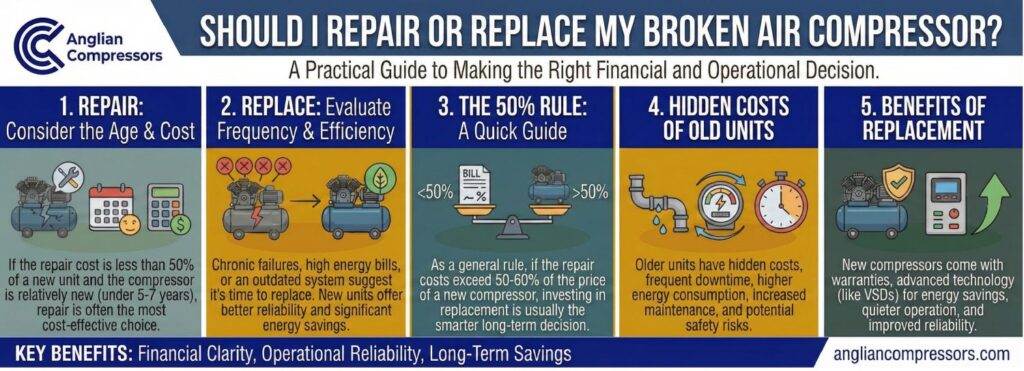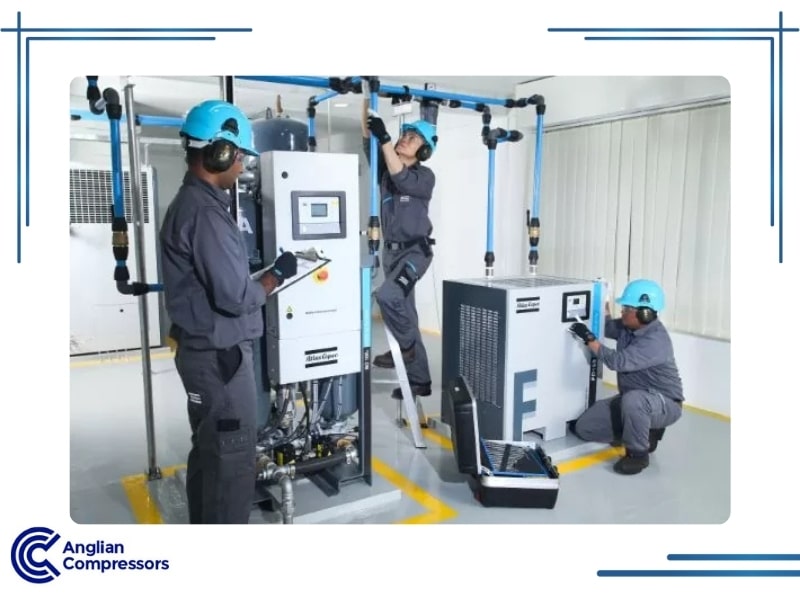Should I Repair or Replace My Broken Air Compressor?
Air compressors are essential machinery. It is immediately noticeable when power tools and other equipment are out of action. Downtime for repairs and maintenance is costly.
Older compressors are prone to repeated breakdowns, so deciding whether to continue repairing an old air compressor or to replace it is important.
This blog post considers when a replacement air compressor is preferable over sticking with an existing air compressor system.
Assessing the Situation
When you repair your compressor, it causes interruption and inconvenience. Even if it is done out of hours, maintenance staff must come in early or stay late to accomplish the task.
Downtime costs hundreds of pounds per hour. At a certain point, retaining a problematic air compressor becomes a false economy. Then, the decision to repair or replace it becomes clearer.
Identifying the Problem
Signs that a compressor may be struggling to operate well are not always obvious but can be spotted.
Here are a few to look for:
- Regular overheating
- Increasingly noisy during operations
- Higher than normal oil consumption
- Lower air pressure output
A full technical diagnostic by a trained technician – like one from Anglian Compressors, a Branch of Atlas Copco Compressors – can quickly isolate areas of concern and prevent future breakdowns.
Evaluating the Severity
Issue severity is highly relevant.
Minor problems, such as faulty valves and worn seals, are expected during regular maintenance. Most are due to wear and tear and do not indicate a significant issue.
Major concerns are more relevant and should not be ignored. A compressor element suddenly failing or a motor dying is costly to replace. When these become troublesome or fail outright, repair costs rise uncontrollably.

When to Consider Repairing
Whether you have a rotary screw compressor or another type, different factors come into play with repair decisions.
Old compressors experience more breakdowns than newer ones. Other considerations, such as the system’s age, how it has held up, the ease of sourcing replacement parts, and operational needs, also matter.
Cost-Effectiveness
Repair costs are relatively low when equipment damage is minor. Sourcing a replacement for a small broken part from a newish compressor is not difficult.
However, parts are not always readily available or produced with older compressors. They are costlier when they are still made because they are manufactured in smaller batches.
Repairs should never cost more than half the machine’s replacement cost; otherwise, a new air compressor is likely a better option.
Extending Equipment Life
Maintaining equipment on a schedule and making repairs extends the useful life of an industrial air compressor.
However, dated compressors may fail at inopportune moments. Given the lost productivity from a stoppage and how less energy-efficient old compressors are, equipment life does not always get extended through increased maintenance and completing repairs.
Situations Favouring Repair
A compressor repair makes sense instead of purchasing a new one when parts are easy to order and receive without delay. Waiting weeks for a part, with operations hampered as a result, is unacceptable.
In this situation, deciding whether to repair or begin looking for an air compressor replacement before serious issues arise is important.

When to Consider Replacing
Whether to replace your air compressor is not only about current reliability.
After determining it is time to replace the air system, there are various potential benefits. Here are a few of them.
Energy Efficiency
A new air compressor is more energy efficient than older models. Operational efficiency improves as technology develops to support it better.
The purchase cost is only approximately ten per cent of the total operating expenses. However, over seventy per cent of lifetime expenditures are for electricity used during operations, which is directly related to energy efficiency.
New technologies, such as variable speed drives, greater output per kilowatt, and better cooling systems, allow the latest compressors to produce more efficient compressed air. This applies whether demand is constant and level or intermittent and fluctuating.
Long-Term Reliability
Reliable compressed air flow and lower failure rates are achieved with new units.
New compressors offer extended warranties, lower operating expenses, and reduce the likelihood of paying for another expensive repair.
Situations Favouring Replacement
When unsure whether to repair or replace, consider the repair history. When repairs cost half or more of the cost of a replacement compressor, it is time to reconsider.
Operational disruption is important, too. How much productivity is lost each time the compressor stops working? Are staff standing around twiddling their thumbs?
Another consideration is whether a compressor is sufficient to support growing operations, compressed air volume needs, or the pressure levels required.
UK regulatory standards should not be ignored, either. Does your old compressor meet the ever-stricter UK environmental standards? Do you expect it to do so in the future? Is this realistic?
Cost Analysis – Repair vs Replacement
Keeping the existing air compressor is not always the best idea.
Performing a cost-benefit analysis is useful and may justify recommending the purchase of a new compressor.
Short-Term vs Long-Term Costs
While repairs may not always be substantial, they add up fast. You might be surprised to learn how much the company pays to help an old compressor stay operational.
Keeping a faulty compressor operational can become a false economy. Replacement units represent an upfront expense but save money in the long run through improved energy efficiency, fewer breakdowns, and minimised future operating losses.
Return on Investment (ROI)
The return on investment (ROI) is relevant. A new compressor lowers energy bills, regardless of the per kilowatt charges. Staying continually operational is important, too.
Calculate the total cost of ownership (TCO) to determine whether keeping an old compressor rather than replacing it makes economic sense.
Energy Efficiency Considerations
Air systems consume large amounts of electricity. Energy expenditures over a compressor’s lifespan are several times greater than the purchase cost.
Here are some energy-efficient considerations.
Advancements in Compressor Technology
Modern compressors benefit from variable speed drive systems, oil-free designs, and smart control systems. Fully optimised air systems maximise air output while reducing the energy expended to produce it.
By using less energy during operations, companies lean into sustainability objectives and reduce their carbon footprint.
Talk with our experts at Anglian Compressors, a Branch of Atlas Copco Compressors, to see how the latest compressors can save you money.
Environmental Impact
Environmental regulations are likely to become stricter over time. Newer air equipment makes it easier to reduce emissions and comply with UK environmental standards.
There are also potential rebates and tax incentives with new capital investments into energy-efficient compressors.
Making the Decision – Factors to Weigh
What factors are relevant when weighing the cost of a new compressor versus retaining an existing one?
Here are three factors to bear in mind.
Operational Downtime
Repair technicians know that repairing newer compressors is quicker. This is because their systems are easier to diagnose and repair. By contrast, finding someone who can fix an old compressor becomes increasingly tricky.
Sourcing parts for newer models reduces operational downtime. The parts are produced more frequently and are, therefore, more readily available.
Future Operational Needs
Does your current compressor provide enough air output to support future needs? Can it deliver the required air pressure at the necessary volume, or does it lose too much pressure and volume because of air leaks?
A new compressor is a strong option for businesses seeing rapid growth. With a greater capacity, a replacement compressor can ramp up air production to meet changing demand.
An older compressor likely cannot do so and, when trying, is at risk of further breakdowns.
Availability of Parts and Expertise
Repairs on older compressor models are problematic because replacement parts are often limited. This significantly delays repairs compared to newer models.
Fewer repair technicians today know how to repair speciality or obsolete air compressors, and this number is diminishing every year.
Conclusion
Perform a cost-benefit analysis to compare the cost of keeping an old compressor operational and replacing it with a more reliable one. Lost productivity due to reduced reliability can negatively affect output and profitability.
Preventative maintenance helps keep older equipment operational for longer. However, there is a point where repair costs and operational downtime become costlier than upgrading.
Consult our air compressor experts at Anglian Compressors, a Branch of Atlas Copco Compressors. They can help you make an informed decision about the best next steps.

